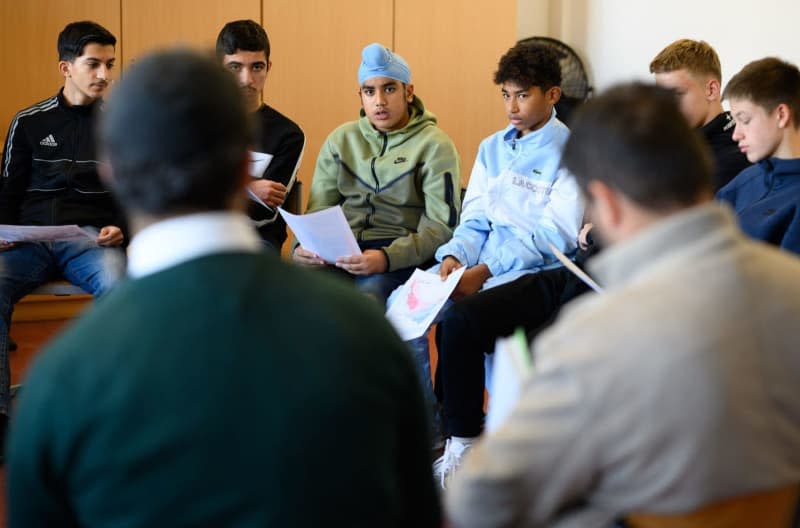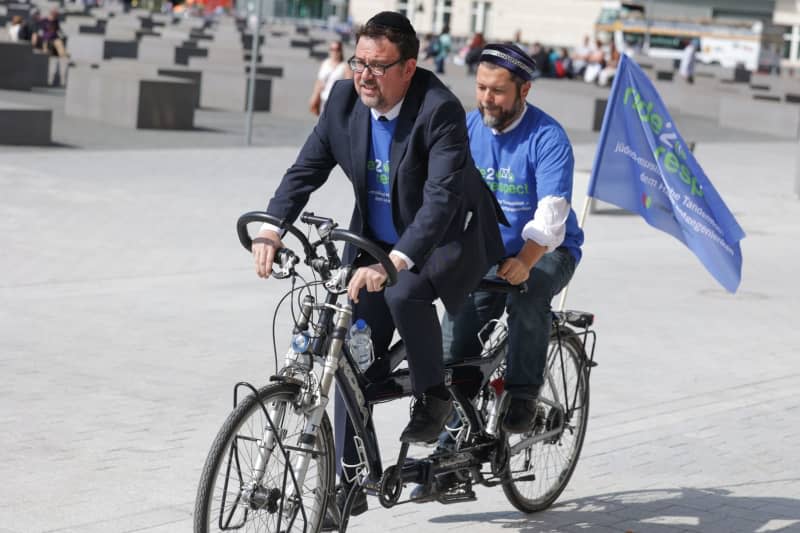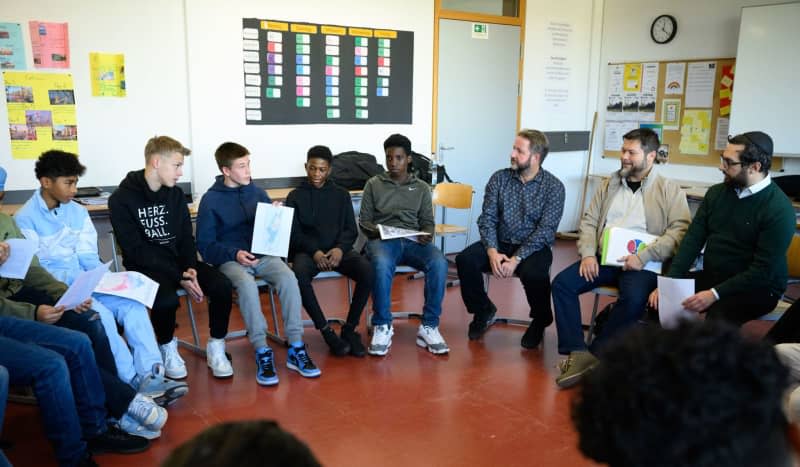Imam and rabbi visit Berlin schools together to promote understanding
- Oops!Something went wrong.Please try again later.
Ender Cetin and Igor Itkin only visit Berlin schools together. For 90 minutes, the imam and the rabbi take over the classroom.
On one visit, the group of ninth grade teenagers at the Otto Hahn Secondary School in Berlin-Neukölln are already sitting in the circle of chairs when they get started. Around 20 pupils, including Arda, Taylan, Jihad, Jamiro, Mahmoud and Ilayda, look at the unlikely couple.
These students' families come from Algeria, Egypt, India, Syria, Albania or Turkey. There is also a Kurd from Iraq. For the imam and the rabbi, this is the norm. They often have classes in front of a group that is just as mixed as the Neukölln neighbourhood it is located in. The district is one of Berlin's heavily immigrant neighbourhoods.
There are 850 pupils at the school. Children from Jewish families are comparatively rare, says head teacher André Koglin. The proportion of Muslim pupils is significantly higher. Ender Cetin often asks during his lesson visits whether he is the imam or the rabbi - and the young people are regularly wrong. That's a first teaching opportunity: you can't tell at first glance whether someone is Jewish or Muslim.
This time, in the opening round, he asks why Jerusalem is so important for both religions and also for Christianity and then passes around photos of the Wailing Wall and the al-Aqsa Mosque.
"Jerusalem," he says, "is a blessed place for everyone."
When he asks what else Christianity, Judaism and Islam have in common, he finds several answers: that Abraham plays an important role in all three religions, that all three have a holy scripture and only know one God, for example. "But do they also believe in the same God?" asks the imam. The pupils are clearly unsure. Can that be true?
"Does the rabbi believe in Allah?" Cetin asks his Jewish counterpart. Itkin doesn't hesitate for long: "Yes," he says - after all, Allah is simply the Arabic word for God. And it is also clear to the imam: "Jews, Christians and Muslims believe in the same God - and yet we argue."
Cetin and Itgin are a well-rehearsed team. More precisely, a tandem, as they say at meet2respect, the organization they work for. The people who work there believe that education and encounters can break down walls in people's minds and help to overcome hatred and hostility.
This has not become any easier since the Islamist Hamas attack on Israel on October 7. It is no coincidence that the two of them are starting to search for common ground between cultures and religions. At a time when so many are pointing out what divides them, it is all the more striking.
"It is always important, and now more than ever, to emphasize the similarities that exist more than the differences," says Cetin.
But the Q&A session is just the warm-up exercise. The next topic is the Middle East conflict. What do the young people aged between 14 and 16 know about its history and background? Do they know when the state of Israel was founded? Why the Six-Day War with the neighbouring Arab countries broke out in 1967? Why PLO leader Yasser Arafat and Israel's Prime Minister Izchak Rabin were awarded the Nobel Peace Prize?
The meet2respect team believes that knowledge helps people to understand connections and become sceptical about hate speech.
Cetin and Itkin hand out historical photos and maps to the students, who are asked to describe what they see on them - and give a hint as to which year they are referring to. This is already difficult with most of the photos and no easier with the maps.
Itkin then hands out a piece of paper with information for each photo and each card. And then it's the students' turn again: they have to develop a timeline, put all the pictures and maps in the right order - and sort the history of the Middle East over the past 100 years.
But what is the point of all this? Does it help Muslims to develop more understanding for Jews? That there are fewer hate-fuelled shouts wishing death to Israel at demonstrations on the streets of Berlin? Headmaster André Koglin is cautiously optimistic: "It moves a lot of pupils, for sure," he says. "We'll see over the years whether it leads to change."
It is clear to him that the tandem visits are just one of several components. "Integration into lessons is important." At his school, this happens in ethics lessons in the eighth grade and in social studies lessons in the ninth grade, when the topic of the Middle East conflict is discussed.
But Koglin is also convinced that it helps when the rabbi and the imam come by for at least 90 minutes.
"It's much more than a drop in the ocean," he says. "It's an offer to talk about the topic, to hear other views, other opinions."
But Koglin is a realist. "We're not going to solve the conflict here in Neukölln," he says.
The possibilities of meet2respect are limited in any case. The organization was founded in 2013. "The number of school visits has risen steadily since then," says project coordinator Lina Witt. She expects a total of 220 for 2023.
"Demand is higher than ever. We are now only offering appointments again in June because everything is already full before then."




